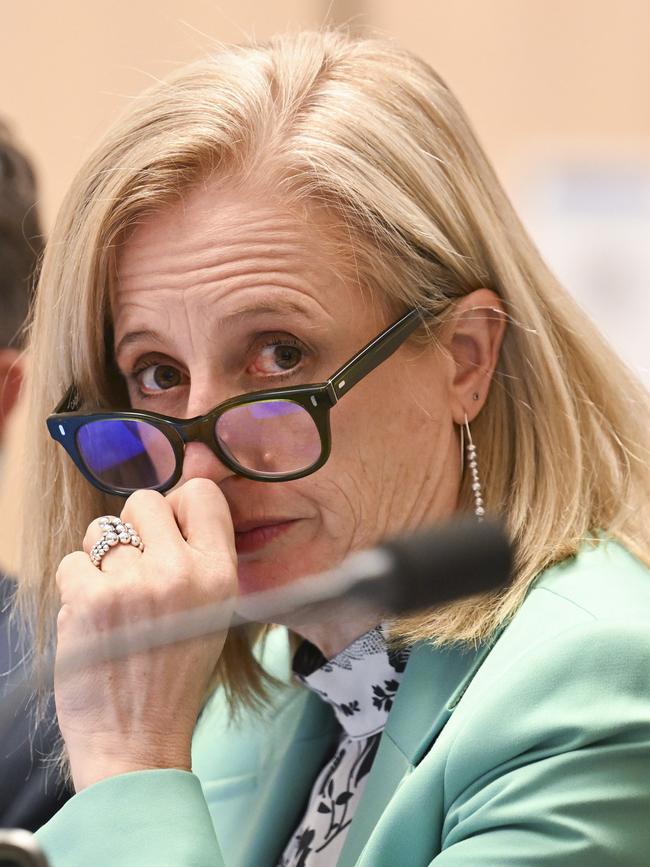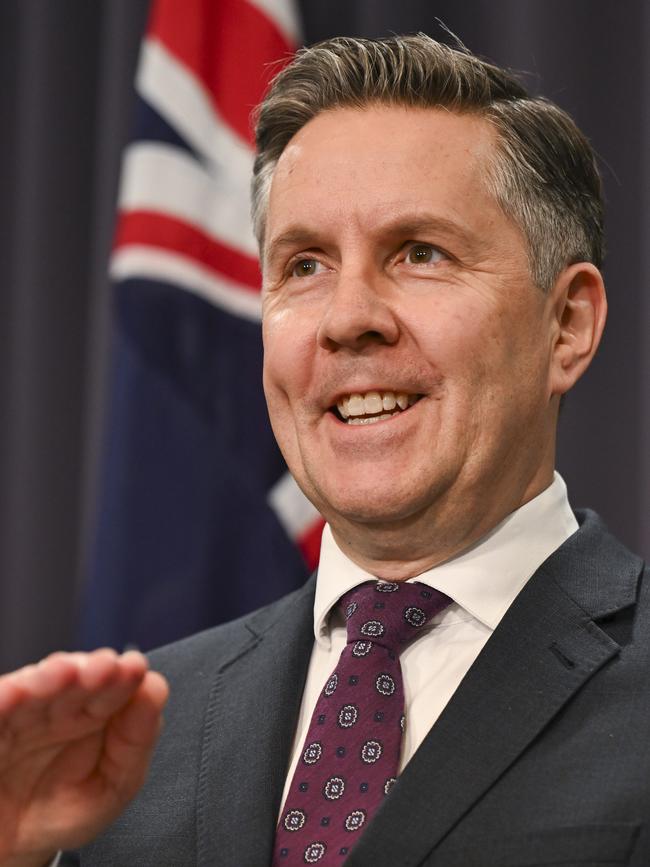Health officials warn of ‘practical limitations’ to medicine subsidies despite ‘triage’
Katy Gallagher’s warning of a new ‘reality’ for medicine subsidies sits at odds with promises of faster bureaucracy, as the government navigates drug delays.

Fears of ongoing delays to critical new medicine subsidies have been stoked by a Health Department admission that its independent drug assessor will continue to place a “maximum number” on submissions considered at its meetings, despite Health Minister Mark Butler calling an emergency meeting over the decision to indefinitely delay 45 medications.
It has now emerged that Mr Butler knew of the unprecedented decision for almost a month before the crisis became public.
A group of Health Department officials led by Finance Minister Katy Gallagher was questioned on Thursday at Senate estimates over the Pharmaceutical Benefits Advisory Committee’s unprecedented decision to delay the medication recommendations in response to excessive submissions.
The announcement was quickly followed by departmental efforts to “triage” the delay, and the introduction of an additional PBAC meeting to work through the deferred submissions.
However, Senator Gallagher told the panel on Thursday the PBAC would continue to grapple with “finite resources and time”.
“I think you also need to accept the reality of the fact that there is only so much that one PBAC meeting can do,” Senator Gallagher said.
“If you get double the amount of submissions or whatever it is close to that, including complex submissions, there is finite resources and time to deal with that.
“It’s not a mass deferral. There is triaging under way so that a reasonable amount, or the most that can be done at March’s meeting can be done, and then an extra meeting can deal with the other submissions.”
On November 4, Mr Butler first confirmed he was concerned with the response of his assessor, and directed his department “to urgently engage with (industry body) Medicines Australia to examine all potential solutions”. By November 6 he confirmed an additional PBAC meeting for May 2025.
Despite this, documents tabled by the Health Department following questions on notice indicate he was informed of the excessive PBAC demand much earlier, on October 9.
According to the timeline provided by the Health Department, Mr Butler directed his department to inform Medicines Australia of the problem that day, before contacting independent evaluators on October 11 to determine whether they could meet the workload.


An October 16 PBAC triage meeting was held to determine which submissions would be deferred. Less than a week later, Medicines Australia and the relevant applicants were informed of the decision to hold back some submissions.
On October 23, those same applicants were issued invoices despite the delay to services.
The public was made aware of the change in process on October 30.
Since the announcement, health officials have contended there is no intention to defer future submissions, but confirmed in estimates there were internal processes changed in response to the excessive applications.
Health Department deputy secretary Duncan McIntyre said the new submission limit would not be “a hard and fast number”, as staff indicated the measure was not intended to prevent their scaling up of evaluator capacity.
Health resourcing deputy secretary Penny Shakespeare said in estimates there were “practical limitations to what can actually be considered by our external contracted evaluators in future”, while economist Blair Comley called the measure a “way we can practically work through this unprecedented spike”.
Opposition health spokeswoman Anne Ruston, who initially levied the questions at estimates, told The Weekend Australian Mr Butler had dodged responsibility for the debacle.
“The department has belled the cat and admitted that there is an ongoing cap on the number of medicines that can be considered for listing on the PBS under the Albanese government,” Senator Ruston said.
“After deflections and denial from the department and the government, we now have worrying confirmation that there could be ongoing delays in patients’ access to essential new medicines.
“This is the first time in the history of the PBS that a cap of this nature has been put in place.
“The Minister for Health must clarify whether he agreed to this cap being put in place, and whether he will guarantee its immediate removal.”
A spokesperson for Mr Butler said the Health Department was “ensuring patients get access to life-changing medications and treatments as quickly as possible”.
Former Pharmaceutical Benefits Scheme chief and Better Access Australia chair Felicity McNeill said calling a May 2025 PBAC meeting amounted to an “acknowledgment” of a “breach of the community’s trust”.
“The PBAC is his committee and the community needs him to lead on this issue now and moving forward,” Ms McNeill said.
“The fight is not over until this is all resolved, but seeing the system start to move is a great first step.”
Ms McNeill argued the government response still lacked transparency given a list of delayed medicines had not been made publicly available.
Parliamentary documents indicated the number of submissions to be considered across March and May had reduced from 77 to 63 since the announcement of deferrals.







To join the conversation, please log in. Don't have an account? Register
Join the conversation, you are commenting as Logout